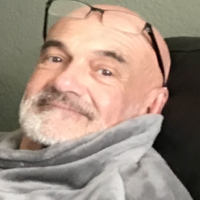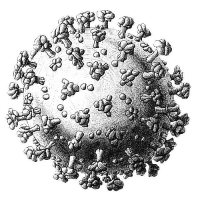 The evening started at the Smoking Goat, Roland's favorite eatery. After the meal and several bottles of wine we moved to the Bluefoot Bar and Lounge. After the obligate conversation about how it was a shame that the place had been converted from a leather bar to hipster hang-out, we took our drinks to a booth and proceeded to argue about flow cytometers, viruses, and immunology. The entire time Roland's hands were explaining his talking points faster than his mouth. And nothing would get his hands moving faster than bringing up the FACS facility; he loved these machines and the work they could do. All you had to do was mention that microscopy was a better technique and you would be inundated with reasons why flow cytometry was more elegant and generally superior. Roland could not help rising to the FACS-versus-microscopy bait and this time his diatribe left his semi-inebriated audience laughing so hard that glasses were spilled, and bouncers dropped by to see if we were "Okay"?
The evening started at the Smoking Goat, Roland's favorite eatery. After the meal and several bottles of wine we moved to the Bluefoot Bar and Lounge. After the obligate conversation about how it was a shame that the place had been converted from a leather bar to hipster hang-out, we took our drinks to a booth and proceeded to argue about flow cytometers, viruses, and immunology. The entire time Roland's hands were explaining his talking points faster than his mouth. And nothing would get his hands moving faster than bringing up the FACS facility; he loved these machines and the work they could do. All you had to do was mention that microscopy was a better technique and you would be inundated with reasons why flow cytometry was more elegant and generally superior. Roland could not help rising to the FACS-versus-microscopy bait and this time his diatribe left his semi-inebriated audience laughing so hard that glasses were spilled, and bouncers dropped by to see if we were "Okay"?
It was time to leave bar and we stumbled back to Roland's house. Before we could escape in cabs, there was the notorious Roland garden tour. Any party or visit to Roland's house somehow involved the garden. Roland loved his cacti and euphorbia even more than his flow cytometers. He had hundreds of these succulents and other flora. In the middle of the night, Roland told tales of his plants and their lives. There were plans for getting rid of one tree to make space for planters. And there was the passionfruit vine he saved from a mediocre life in a dark space, now thriving. He so earnestly loved talking about those plants that it was hard to exit and get some much-needed sleep.
Even more loved were the viruses. Not the "fake viruses like phage," but the real killers like HIV, Dengue, and Chikungunya. Roland was enamored with the elegance of their overlapping reading frames and polypeptides. And he knew that this elegance was also their weakness: cells did not need to process polypeptides. Roland wanted to kill these killers. Only now, with CoVID-19 sweeping through the world, can the younger people understand how terrifying AIDS was to Roland's generation. And being a gay man made it so much worse. He decided to fight HIV and other viruses. He probed their biology and genomes to identify potential therapeutic targets that could be assayed with his beloved flow cytometers. One of the tragedies of his untimely death was the loss of a great virologist, who could have built the protease screen we so desperately need for SARS-CoV-2.
This exuberant scientist was surprisingly private. Most colleagues did not know he was a talented painter who loved to gamble. There were only brief glimpses of his love for Cameron. He was a bit of a Momma's Boy, the prima donna of the family of four brothers and a doting mother. Anyone who had ever seen Roland and his mother strolling through the SDSU campus, on one of her month-long visits to San Diego, could see immediately how close they were. Roland and his brothers are so alike in personality that it is often hard to tell them apart. It is hard to imagine the devastation of Roland's loss to this joyful family, a pain compounded by CoVID-imposed separation.
Roland's public life centered around his lab and teaching. He worked tirelessly at both, and his students loved him for it. He won teaching awards and the Wolkowicz labbies are a tight-knit group that loved their leader. Even while fighting cancer, his held his lab meetings regularly. Beyond his lab, his greatest legacy may be the thousands of undergraduates who prized his hand-waving, dramatic, and fun lectures on viruses and their cellular hosts.

Your generous contribution will help support the viral ecology and personalized medicine research efforts at San Diego State University.
Send Your Gift